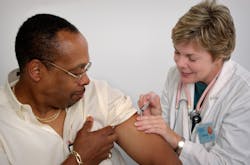The Federal Motor Carrier Safety Administration is weighing guidance that could allow certified medical examiners to use technology to expand their ability to conduct required physicals on commercial motor vehicle drivers, but as of today those exams must be conducted by certified examiners, the agency confirmed. As of May 21 of this year, all physical exams must be conducted by a professional listed on the National Registry of Certified Medical Examiners.
In written statement, FMCSA told Fleet Owner: “By regulation, all USDOT physical exams must be conducted and verified by the growing list of 35,000 Certified Medical Examiners on FMCSA’s National Registry. The agency is considering issuing guidance to address situations in which a healthcare professional may assist a Certified Medical Examiner to conduct an exam using technology, but has not yet done so.”
Fleet Owner’s inquiry to FMCSA was prompted by a draft of guidance the American Trucking Assns. had prepared in response to members’ concerns about the availability of certified examiners, especially in rural areas. The draft was erroneously posted to an area of ATA’s website that was publicly accessible, but the association never alerted its members to its availability, ATA told Fleet Owner.
The draft document, which ATA has since pulled from the website, stated that ATA had asked FMCSA whether “telemedicine” or other remote technologies could be used to comply with the regulation. One scenario would be that a driver takes required tests, such as vision or hearing, at a local facility and completes the examination with a certified examiner through video teleconferencing. Another scenario might involve a non-certified examiner conducting the actual exam but then reporting the findings by telephone to an examiner who is on the registry and who could then issue the medical certificate.
According to ATA’s draft, in a meeting earlier in 2014 a senior FMCSA official said that FMCSA does not preclude telemedicine such as envisioned in the first scenario. Assuming that is true, ATA staff believes that the second scenario also would be considered acceptable.
Although ATA is not disseminating its draft guidance on telemedicine, the association told Fleet Owner that it still wants to know whether FMCSA believes that the scenarios described in the draft document are permitted under the rules as they indicated in the meeting earlier this year or whether they plan to interpret the rules differently.
A number of groups have questioned whether there are enough certified examiners – especially in remote areas – to conduct timely medical exams. In April, the Owner-Operator Independent Drivers Association asked FMCSA to postpone the May 21 deadline, but the agency declined to do so.
